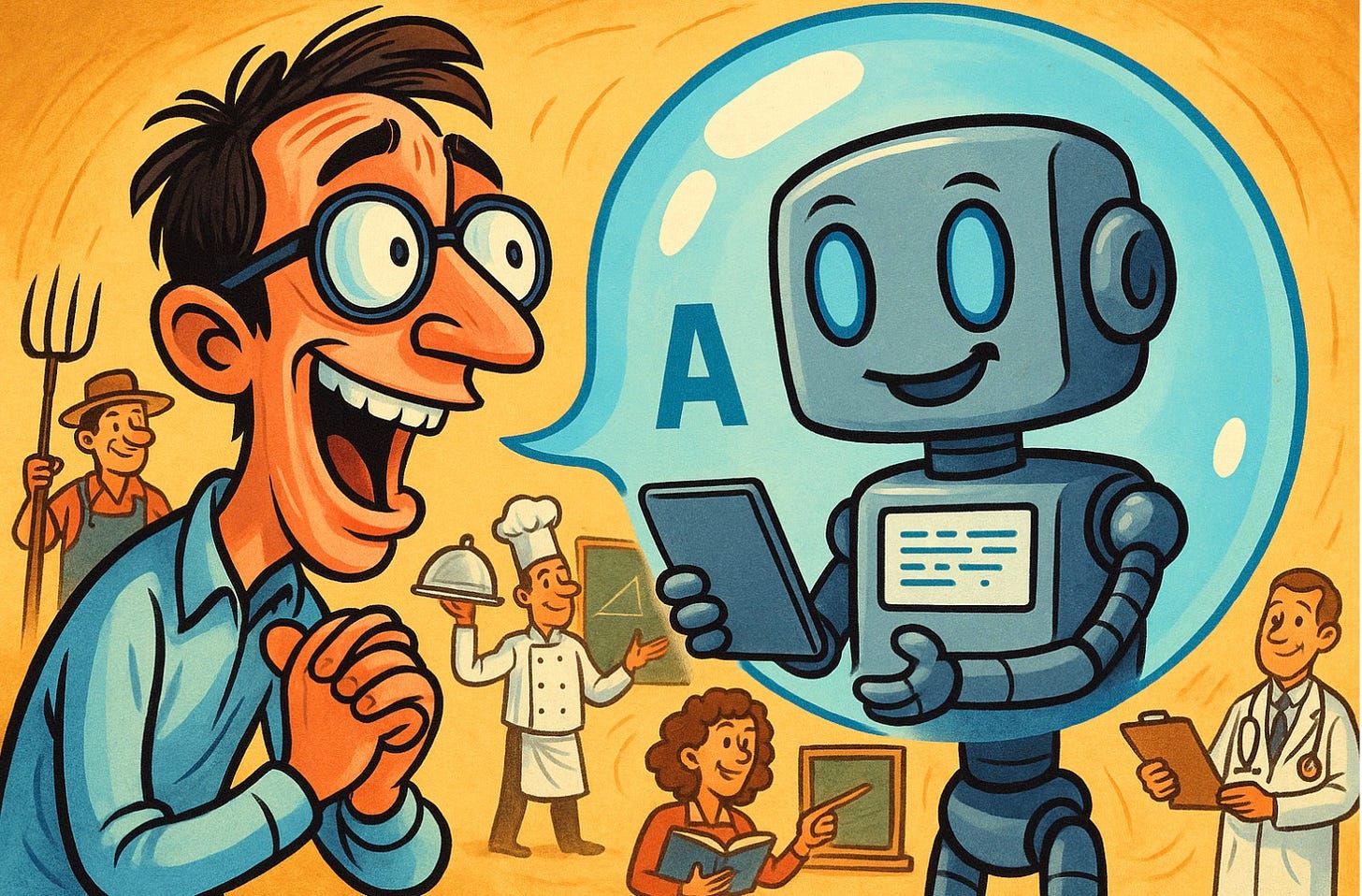Not Everything Has an API: Life Outside the Prompt
Spend enough time in tech circles, and you’ll meet them—smart, thoughtful people who genuinely believe AI is on track to replace everything. Accountants? Automated. Developers? Obsolete. Teachers? Swapped out for YouTube and AI tutors. Chefs? Just a robot arm and a well-phrased prompt. Some even talk about replacing doctors, as if diagnostics and care are just another data set to parse.
Of course, AI will help—tremendously. It's already doing incredible things. But here’s what’s starting to worry me: some of the brightest minds I know are now so deep inside the AI bubble, they’ve forgotten the rest of the world is still out there.
Wait… There Are Businesses Without APIs?
You’d be surprised how many tech folks genuinely forget that most of the economy isn’t built on subscriptions, SaaS dashboards, or code. There’s a whole world out there—plumbers, nurses, warehouse workers, farmers, chefs, track drivers, mechanics—doing work that keeps society functioning and doesn't involve a single line of Python.
Sometimes it feels like if something isn’t mentioned in Hacker News, Reddit, or X, it doesn’t exist. You mention that your neighbor owns a chain of dry cleaners and someone goes, “Oh, like on-chain laundry NFTs?” No. Just laundry. You know—shirts, starch, steam.
This disconnection isn’t just a meme. It is real.
AI Only Knows What We’ve Given It—And That’s Not Much
Let’s talk about AI for a second. It’s not some all-knowing entity. AI models like ChatGPT are trained on what?
Text
Audio
Code
Some images and video
That’s it. That’s the menu. If something hasn’t been written down, recorded, uploaded, or fed into a data center, AI has no idea it exists. And we’re not even talking about the fact that today’s AI doesn’t understand anything—it just predicts what looks like the “right” answer.Sure, many people love to talk about AGI, claiming it will “understand” soon. But again—based on what data? Still the same disconnected, secondhand inputs. You can’t build real understanding out of scraped content and guesses.
Now think about how much of human knowledge is unwritten:
The smell of wet soil after rain (AI has never smelled it)
The way a mother knows her baby’s cry
The pause before someone says “I’m fine,” and you know they’re not
The muscle memory in a carpenter’s hand
The intuitive “something’s off” moment a good mechanic has before even opening the hood
The gut feeling a seasoned doctor has just by seeing a patient, even before any test results come in
These aren’t just poetic flourishes. They’re human superpowers. And none of them are in the training data.
Humans Have More Than Text Inputs
We’re not just language processors. We perceive the world with sight, hearing, smell, taste, touch—and let’s not forget:
Balance (your inner ear keeping you upright)
Temperature
Pain
Proprioception (your awareness of where your limbs are)
Intuition (which science still struggles to explain but we all feel)
AI has none of that. Zero. Yet somehow, in tech circles, we talk about AI “understanding” the world. How can it understand a world it can't physically experience?
Feeding AI all the books and blogs in the world is like giving a Martian a bunch of IKEA manuals and asking them to explain human love. It’s not gonna happen.
The Real Danger Isn’t AI Replacing Us—It’s Us Replacing Ourselves
Here’s what really keeps me up at night: not AI outpacing humanity, but people losing their grip on reality. People thinking we’ve already built something superior to humans. People who haven’t talked to someone outside of their cohort in years. People who assume a prompt is all you need to solve a construction problem. (Spoiler: it’s not.)
And let’s be honest: how many times have you seen someone trying to solve a real-world problem with another app… when maybe the answer was just talk to a person?
The more we stay trapped in the AI bubble, the more we risk becoming spectators in our own world. We’ll think we’re advancing, but we’ll just be losing context, empathy, and grip.
Even the Best AI Still Needs a Plug Socket
Let’s not forget: even the most powerful AI in the world still needs electricity. It needs hardware—real, physical chips—shipped through real-world supply chains, cooled in massive data centers, maintained by technicians in boots, not hoodies. AI doesn’t run on magic. It runs on infrastructure. Human-built, human-maintained, sometimes human-swearing-at-it infrastructure.
Tech doesn’t float above the real world. It stands on it.
Reality Has No API
When you live in a world of APIs, prompts, and tokens, it’s easy to forget how many things can’t be abstracted or outsourced.
You can’t API your way through a relationship. You can’t prompt empathy. There’s no webhook for grief. No scalable architecture for intuition.
These things don’t live in data—they live in us. And unless we stay engaged with real people and real problems, we risk building tools that solve nothing but our own sense of cleverness.
Final Thought: AI Can’t Taste Cheese
Yes, AI can generate recipes. It can describe the flavor of cheese with precision. But it’s never tasted it. It doesn’t know.
So use AI. Push the limits. Build amazing things. But don’t lose touch with the part of you that knows what cheese tastes like.
That’s the part AI can’t replace.
And that’s the part we should never forget.

